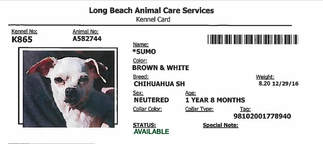We have completed our review of the Long Beach City Auditor's report and are dismayed to see how bad it is for Long Beach's shelter animals.
0 Comments
 Just this week, the Long Beach auditor released the audit of Long Beach Animal Care Services that was requested by the mayor, after three years of continued pressure from Stayin' Alive and other concerned citizens in Long Beach. Stayin' Alive is currently reviewing the report and will have a comprehensive analysis of it in the coming days. A preliminary review shows that the report makes many of the recommendations Stayin' Alive has made repeatedly over the past 4 years, including those made in two comprehensive research reports. However, there are at least two items that give cause for concern, which we'll preview for you now. Massive Loophole for the City: One problem that is immediately clear is that many of the recommendations that the report makes are for "Best Practices." These Best Practices, according to the Auditor's office "may not be possible in all circumstances." This leaves a massive loophole for Mayor Garcia and the City to fly through -- and disregard those practices. It is clear that the animal community in Long Beach will need to continue to monitor, and (given the City's historic unwillingness to act) more likely pressure, the City to make sure the Best Practices are followed. We'll have more on whether those Best Practices are truly "Best Practices" in coming days. The Problems with SpcaLA Get Last Priority: The report also classifies recommendations into Short-Term and Long-Term recommendations. The Auditor has made a clarification of the troubled relationship between Long Beach Animal Care Services and SpcaLA a "Long-Term Recommendation." This relationship, which has resulted in the killing of tens of thousands of animals over the past 19 years, has been disastrous to shelter animals in Long Beach since the lease agreement between SpcaLA and the City was forged back in 1998. Long Beach shelter animals have been in drastic need of a reform of the toxic partnership between the two entities for nearly two decades. The current agreement is slated to be in place until 2053. Depending on how the City defines "Long-Term," this recommendation could be all but meaningless, and stretch until 2053 or longer, meaning our shelter animals will continue to be killed needlessly. This is not surprising; JVR Shelter Strategies, the consultants hired by the City to work on the audit, is not aligned with the concept of No Kill. Their website lists consultation on "euthanasia practices" as a service they offer, but nothing about adoption programs, foster programs or other lifesaving programs that shelters -- especially Long Beach Animal Care Services -- need to have. We'll have more on the report in the next few days, but we encourage all of you to: 1. Read the report; 2. Evaluate it in terms of how it serves or does not serve our shelter animals, and the animal-loving community and taxpayers of Long Beach; and 3. Speak up for our shelter animals to your City Council member and at City Council meetings. Read the Auditor's Report here: bit.ly/acsro Read the three things you need to know about the auditor's report here:https://goo.gl/v9V8h4  In a recent e-mail to Stayin’ Alive Long Beach, the Long Beach Auditor’s office has once again confirmed that Phase One of the audit of Long Beach Animal Care Services is due out by the end of the year. As part of the data-gathering process, the Auditor's office received input from members of the public. Stayin’ Alive was among those who gave input. As many of you know, our input is based on our research, which utilizes data from LBACS obtained through the California Public Records Act. One of the animals we told the Auditor about was a little dog named Sumo. Today we are going to tell the story of Sumo on this page – a chihuahua who entered LBACS in December 2016 with his siblings and was burned over large portions of his body while at LBACS. Sumo entered LBACS on December 6, 2016. His notes say he was “skittish and scared,” most likely because he had been separated from his siblings. Shelters are stressful for animals, so this is not surprising. According to LBACS records, on December 14, the neighboring SpcaLA “passed” on Sumo – meaning they declined to take him in -- because of his behavior. He was fearful, LBACS records state. Two days later, on December 16, not surprisingly, Sumo started coughing and sneezing, which is always bad news for animals at LBACS. Because there is no adoption program at LBACS (because Mayor Garcia now allows SpcaLA to do the vast majority of adoptions, rather than having a strong adoption program run by LBACS) animals get sick at LBACS every month and are killed. LBACS director Ted Stevens justifies these killings, saying that they are not done for time and space but because the animals are ill. However, the part that is consistently left out is the fact that LBACS is the one that made them sick by not having an adoption program that gets animals into homes quickly. Luckily for him, Sumo bounced back from his cold, but on January 4, he was dealt another cruel blow: a note in his record states that SpcaLA “will no longer show dog” because of his behavior. Again, he was fearful, which is not surprising for a small dog who is scared and stressed in an animal shelter. Finally on January 9, more than a full month after he arrived at LBACS, a potential adopter was found. Things were looking up for little Sumo. But right before he was to be adopted, something happened that introduced a harrowing, painful period in little Sumo’s life. On January 11, seemingly out of the blue, Sumo’s record notes that there were “large areas of erythema” (redness due to injury) across his body that was suspected to be a “thermal burn.” Sumo’s LBACS records don’t state how the burn happened. All we know is that there were no burns noted in Sumo’s records when he came into LBACS, and suddenly, on January 11, more than a month after he arrived at LBACS, he had severe burns to large portions of his body. Make no mistake: Sumo’s burns were severe, covering large areas of his body. His LBACS record notes that the burns required “surgical repair.” We can only imagine how painful this was for little Sumo. Scared, sick, rejected and finally somehow burned -- the records don't say how -- while at the shelter. It was amazing that Sumo survived. Sumo’s story is the story of a shelter that is broken and that needs reform. We have told the Auditor about Sumo’s story, as well as other animals’ stories – stories that clearly show that LBACS is in dire need of reform. We have also presented data about the programmatic problems at LBACS, including the lack of an adoption program, lack of a foster program, the problematic and non-transparent nature of LBACS’ relationship with SpcaLA and the large numbers of animals that are killed as a result of this lack of programs. We sincerely hope that the Audit will address these issues and that city officials, many of whom are coming up for re-election in April, will take decisive, much-needed action to improve the Long Beach animal shelter. The good news is that after he was burned while at LBACS, Sumo was eventually taken to an outside vet – by a rescue, not by LBACS. His wounds were treated, and he was adopted. But he went through so much unnecessary pain, sadness and rejection to get there. Let’s be clear. What happened to Sumo is negligent, inhumane and wrong. And it happened at the LBACS shelter. It happened at OUR shelter. Long Beach deserves a reformed shelter that truly commits to lifesaving. Please be a voice for the animals - let your city council member know you want major reforms at the LBACS shelter. Our shelter animals deserve better. |
Archives
June 2022
SALB
An initiative to make Long Beach a No Kill community. Categories |
No Kill Long Beach
- Home
- ::NKLB in the News::
- 2020 Voter Information Guide
- How you can help
-
Get Informed
- Contact Us
- LBACS's Numbers
- Model No Kill Ordinance
- LB City Officials' Contact Info
- No Kill Long Beach Blog
- Justice for Thor
- LBACS Complaints
- A Shelter in Crisis
- 2018 Candidates' Responses
- LBACS Document Archive
- Why "Compassion Saves" is No Good

 RSS Feed
RSS Feed
